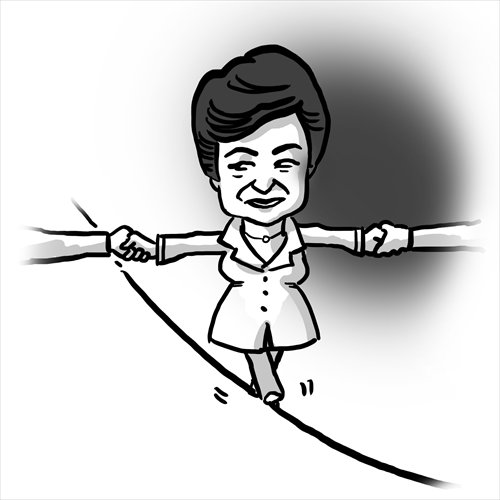Xi’s visit to Seoul set to open a new era of bilateral relations

Illustration: Liu Rui/GT
Chinese President Xi Jinping's visit to Seoul this week has significant bearing not only on the bilateral relations between Seoul and Beijing but also on the dynamics in the region.
The Chinese leader is coming to Seoul at a time when Northeast Asia is entangled in a web of diplomatic challenges, from North Korea's nuclear threat, territorial and historical disputes against Japan's rightist drive, to rivalry between the US and China.
Xi and South Korean President Park Geun-hye undoubtedly will have a lot of bilateral issues to discuss, including the ongoing negotiations on a free trade agreement and boosting the level of their partnership. The warming of the ties between the two countries also signals enhanced cooperation in military, security and safety areas.
One of the key elements of the Xi-Park summit could be Japan, the troublemaker that has stirred territorial and historical disputes and is pushing a campaign to expand its regional power. Both victims of Japan's past military expansionism, Seoul and Beijing, have been taking similar steps, if not joint ones, regarding Japanese leaders' moves to gloss over Japan's past wrongdoings and seek a greater role on the international stage.
The most recent example of the two countries' endeavors to counter the Japanese moves and set history right is the dedication of a memorial in Harbin, Heilongjiang Province, for Ahn Jung-geun, a Korean independence hero, and a Korean Independence Army monument in Xi'an, Shaanxi province.
The Xi-Park summit in Seoul will do well to serve as an occasion to put fresh pressure on Japanese Prime Minister Shinzo Abe and his followers to correct their ill-advised rightist campaign that only deepens its isolation in the region.
Because of this isolation, Japan is trying to keep close relations with the US and even improve ties with North Korea. The US, which feels it needs to check China's rise, tends to be tolerant of Japan. In this context, some see Sino-South Korean relations as a "historical alliance" against Japanese revisionists.
On the other hand, Seoul and Beijing are still stuck in a Cold War-style security dilemma. The Seoul government has broad public support for pursuing a balanced, but heavily pro-US, policy to strengthen its alliance with the US and to further its strategic partnership with China at the same time. However, the strengthening of the US alliance with South Korea is largely viewed by China as part of the Obama administration's strategy of containing China.
Recently, the US has been taking steps to deploy the Terminal High Altitude Area Defense (THAAD) in South Korea. THAAD is a defense system which intercepts short- to mid-range missiles and is the key to US missile defense (MD) system.
The Seoul government has claimed that it will not take part in the US MD system and that it will establish its own Korea Air and Missile Defense (KAMD) system. Yet, many Koreans cannot erase suspicions that the government is actually leaving the door open to its involvement in the US MD system on grounds of interoperability with the US system. Seoul is walking a tightrope between the US MD system and Korea's.
In an attempt to raise relations with Seoul to the level of comprehensive strategic cooperative partnership, this time Xi may not bring up the issue of US pressure on Seoul to join the MD system.
The Park government is well aware of Beijing's adamant opposition to the deployment of the THAAD system in the South. Therefore, this is one of the impending security issues for which Park should be prepared with a convincing position.
Seoul also wants Beijing's cooperation for the denuclearization of North Korea, deterrence to provocation and war, and the development of a regional environment conducive to building a foundation for unification.
Although faced with a gamut of problems awaiting solutions, the prospects of Sino-South Korean relations are bright. It is not just because Xi will break the precedent set by his predecessors by choosing to visit Seoul ahead of Pyongyang. Actually, bilateral relations between Seoul and Beijing have steadily improved since their leaders took office early last year.
Xi is favorably regarded by the Korean public. Xi, who will certainly get a red-carpet welcome from the Korean people, is expected to pave the way to foster Seoul-Beijing ties as well as stabilize the Northeast Asian region.
The author is a professor with the Asiatic Research Institute of Korea University. opinion@globaltimes.com.cn